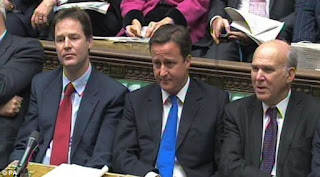Several months ago, I wrote a post on the Liberal Democrats’ failings (here). But the resulting question was left unanswered: what do they need to do to improve? I’m not the authority on that though, so I had a chat with Sir Vince Cable, their 75 year-old leader.
He’s an interesting man, but it was hard to grasp who he was over the course of one evening. At times he was funny, in other moments he was ponderously philosophical and intelligent, but he always came across as courteous and honest, even if his age certainly meant he was a little slower to “get going”.
And so...what did he say? I asked him direct two questions, and have pinched his answer to many others.
Brexit and the economy featured most frequently, but tuition fees, housing and media coverage all surfaced.
Brexit and the economy featured most frequently, but tuition fees, housing and media coverage all surfaced.
Local Housing: “How do you think Liberal Democrat planning policies could make a difference to the local community?”
Vince Cable firstly addressed the need for more housing stock, pointing out the inability of young people to afford housing, before mentioning the party’s success in Eastleigh and Eastbourne; local Liberal Democrats there have ensured that “infrastructure is properly in place” before developing residential homes.
One standout line was his desire to develop “a proper mix of private housing...affordable housing, social housing”. This was backed up by the local party candidate, who pointed to the manifesto as evidence of a coherent Lib Dem policy.
PR and being visual: “How do you see the Liberal Democrats expanding in size and pushing the government in opposition?”
Opening statement: “It’s difficult to be more vocal and visual unless you get an area on the national media”.
This is a concern he’s addressed before, and he later reminded those present that he only gets a Prime Minister’s Questions slot once every four weeks. “Two very difficult general elections” have worsened the problem.
 |
| Old people taking selfies |
This is a concern he’s addressed before, and he later reminded those present that he only gets a Prime Minister’s Questions slot once every four weeks. “Two very difficult general elections” have worsened the problem.
Yet he was pleased to have disproved critics in the recent local elections, hoping that their success would yield more airtime (spoilers: it hasn’t).
He also raised Brexit (Count 1) as an area on which the media could focus, because of the party's distinction on the issue.
He also raised Brexit (Count 1) as an area on which the media could focus, because of the party's distinction on the issue.
National Strategy: “If you are going to avoid being a modest party with much to be modest about, what’s the plan, what does the party need to do about it?”
We’d done it. Local media had irritated Vince Cable. And it only took three questions.
He tersely pointed out Nick Clegg’s tenure as Deputy Prime Minister as an example of national success, and, while he accepted that they had struggled in 2015 and 2017, those failures were “far from being the end of the story”.
He (more calmly now) told us that the party mood was a lot more upbeat, and happily reminded us of their recent success in local government.
He (more calmly now) told us that the party mood was a lot more upbeat, and happily reminded us of their recent success in local government.
 |
| Three's a crowd? |
Tory polarisation and Labour leftism also came up as reasons to turn to the third party.
Young People: “How would the Liberal Democrat party seek to reclaim the younger vote, where it’s often absorbed by Labour or is just apathetic to politics in general?”
Mr Cable took the issue head on, first by discussing that “Labour were very successful at pulling in younger people” at the last general election [disproved: young adult voting levels didn’t change disproportionately in 2017], arguing that their seemingly anti-Brexit(3) stance attracted many. He then, rather predictably, attacked Mr Corbyn for his now-vague Brexit stance, showing how united the Liberal Democrats are in contrast.
Obviously, he had to discuss tuition fees; they have been adapting their policy to reflect the reality of “university finance issues”, and there was optimism about “recovering that ground”. Mr Cable claimed that the Lib Dems are now well received on campuses across the country, often in the ascendancy to Labour.
But the answer finished on a bit of boilerplate about the tech firms and housing, vaguely linked to young people, but mostly showcasing the liberal agendum.
But the answer finished on a bit of boilerplate about the tech firms and housing, vaguely linked to young people, but mostly showcasing the liberal agendum.
Economy: “You’ve traded a few barbs with Corbyn over his economic strategy...what is the Liberal Democrat strategy for the economy?”
Good question - what is their economic strategy?
Mr Cable emphasised the principles of “responsible business”: apparently a mix of free-market enterprise and government-encouraged ethical business. He expressed contempt for both leftist state control and right-wing weak welfare, preferring an imprecise combination of both.
The redistribution of wealth and the 1p NHS tax featured, suggesting a little left-thinking, although he assures that it has “to be done in a mixed economy”. He referred back to his stint in the Coalition cabinet as a source of authority.
And...?
And that’s it! To bring you everything that he said would make this blog never-ending, but hopefully this is enough to satisfy you.
My overall opinion? Even if the party is in a rut, Mr Cable put on a good showing. Do consider them somewhat in 2022.
My overall opinion? Even if the party is in a rut, Mr Cable put on a good showing. Do consider them somewhat in 2022.
But not that much.
Several photo credits to the Wokingham Paper - more can be found at https://www.wokinghampaper.com/





